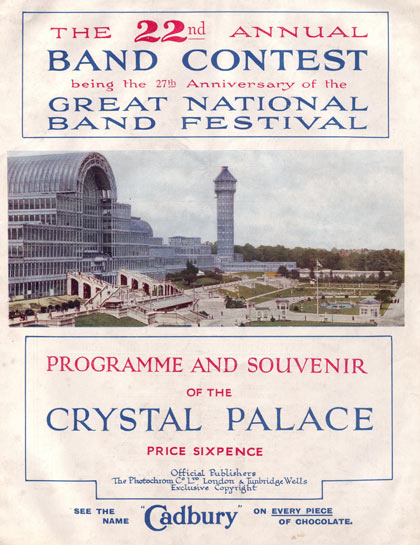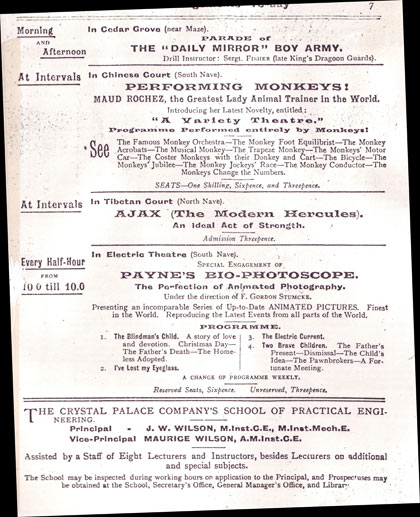Article - Is there nothing new under the Sun?
15-Aug-20064BR has a look through the history books and finds that there really isn't anything new under the brass band sun - with the exception perhaps of performing monkeys at the National Championships.
There is nothing new under the Sun. The old maxim (in its original context it must be said from the Book of Ecclesiastes) has perhaps never been truer in this day and age. In terms of entertainment, where we are told there is innovation and invention, all we get in reality is repetition and variation.

The Palace at its peak: The front cover of the 1927 National programme
When was the last time you really saw something of great originality and substance on the television? Or to put it another way – when was the last time you didn't see something involving a third rate celebrity, an antiques auction or redesigned living room all bundled together for you to use your democratic right to spend £1.50 to vote someone off the programme?
Although we have thankfully yet to come to the point at a brass band contest when the winners will be decided by a mobile phone text vote, you can be sure, it is an idea that has crossed a few febrile minds. The reason is obvious. What really is the main attraction of going to listen to a brass band contest?
Profit and loss
It is a question that in fact has been central to the promotion of contesting all over the world since the great entrepreneurs such as Enderby Jackson set the original template in place at his first brass band contest at Hull Zoological Gardens in 1856. Even then, and especially in the subsequent years when contests were promoted at Crystal Palace and Belle Vue, the brass band contest essentially became a part (an integral one at that) of a greater programme of events to attract large audiences to multi purpose venues and in the process allow the promoters to make a great deal of profit in a short a space of time as possible.
Today, it would be the equivalent of holding the National Finals at Alton Towers on a bank holiday weekend, but to a lesser extent, a variation of the original theme is to be found at Butlins and Pontins each year.
Groundbreaking?
Is there something really that new and groundbreaking about trying to attract an audience to stay and listen to bands performing at a contest through the use of large screen media presentations to get ‘closer to the action'? In 1861, Jackson himself, bored with straightforward contesting masterminded a ‘musical military sham fight' between the bands that involved competitors playing different music simultaneously in different parts of Crystal Palace, all with the accompaniment of an overhead fireworks display!
And what about the introduction of recorded highlights to assist the judges in reaching their decision, as was used at this year's English National? Something new and innovative, or a variation on a theme used at the 1958 British Open when the top six bands were asked to play the test piece again to decide the winners?
One tune band
Musically, things haven't changed that much too. In 1887, officials at a contest in Norland decided to bring in a rule to stop Besses o' th' Barn Band from playing their specially written own choice test piece ‘Reminiscences of Rossini' on the grounds that Alexander Owen's arrangement was now so well known to everyone as Besses own. Malicious gossip in the brass band press called them ‘a one tune band,' and it was an argument that had some credence as they used it 19 times between 1884 and 1886 winning 14 times on it! Owen, ever the pragmatist just went out and arranged his own version of ‘Beethoven's Works' for his band to play and they duly won the contest at a canter.

It doesn't get any better than this - Performing monkeys top the bill in 1905
Fast forward to the European Championships in recent years and perhaps things haven't changed all that much have they now? Who now really thinks that the playing of special commissions such as ‘Music of the Spheres', ‘Journey to the Centre of the Earth' and ‘The Promised Land' were that innovative given what our top bands were doing well over a century ago.
Age old complaint
And what about the age old complaint about adjudicators getting the result wrong? Forget the moans and groans from Belfast and Yorkshire this year. Back in 1888, an adjudicator called Dr Spark underwent a quite harrowing experience after one particular contest where his result was not greeted with uniformed agreement. On the train home (in 1888 he couldn't make the usual quick getaway in the car) he was subjected to such abuse from members of a losing band that players from the winning band had to physically protect him until he got off the train at his home station!
The payment to players isn't a new phenomenon either, with one band secretary reporting in the 1890s that: "The more engagements I got the band, the more avaricious some of the men became. Every penny was divided, and, as a general rule, one half of the men would want to borrow a shilling or two out of the money before I got it. I was always out of pocket, and no matter how many engagements I got, there were no thanks for it." And who says mercenary tendencies are only a recent problem in the banding world?
Getting the top bands to compete at contests hasn't just been a 21st century problem. The success of the late Victorian Crystal Palace and Belle Vue contests had much to do with the transport arrangements rather than just the prize money on offer. Enderby Jackson may have been a brilliant self-publicist with an ego match, (He once remarked that; ‘My name has become a household word in the homes of the British working man,') but he was the first contest promoter (way before Pontins in the 1970s) to arrange with the burgeoning new private railway companies, free transport for competing bands to and from his contest in London.
Money making
Once the bands got to their destinations however, the players, supporters and the general public where his captive audience for the day, and although music making may have been on the minds of the bandsmen, money making was certainly on the mind of the promoters. It has been ever thus.
In 1860 Jackson reportedly brought 60,000 paying customers to Hull Zoological Gardens where a profit of £540 was made – two thirds to the owners and one third to Jackson, whilst he had the same successful profit sharing scheme at Crystal Palace where although he reportedly spent over £1,900 on expenses he also managed to make the organisers very happy with the profit, even though he rather surreptitiously allowed himself £800 for his efforts too.
Today, the major contest venues are indeed multi purpose citadels to consumerism – you can pay inflated prices for anything from a frothy cup of milky coffee and cheese and tomato sandwich to a new piece of art for your living room wall. Walk outside Symphony Hall or the Royal Albert Hall when you don't fancy listening to a performance from a band you don't think will come in the prizes and you can spend your hard earned cash to your hearts content. That though is nothing new too, although, what you spend it on has changed quite a bit over the years.
Thrill a minute
A quick glance at the programmes for both Belle Vue and Crystal Palace in the early part of the 20th century opens an Aladdin's cave of the weird and the wonderful. Where today you can use your credit card to pop into see the delights of Waterworld a stones throw from Symphony Hall, Belle Vue offered you the chance to see the Zoo and have a go on the amazing thrill a minute fairground rides, that so annoyed Fred Mortimer that he refused to bring his Fodens Band there to play.
In 1906 at Crystal Palace, the main National Contest started at 11.00am, whilst at other venues on the huge site, over 130 other bands took part in various other competitions. If however, you had quickly had enough of listening to the bands, there was a veritable cornucopia of other things going on to entertain the masses.
In the grounds were Sir Hiram Maxim's ‘Captive Flying Machine –The Sensation of the Age! (Admission 6d for adults); palmistry and phrenology from Alice Lee, a descendent from the world famous Gypsy Rose Lee, (3d for children); Turkish Baths; Tableaux of The Great Fire of London and Naples Harbour; Distorting mirrors; Ajax (The Modern Hercules – An ideal act of strength!'; The Fairey Archipelago and the Electric Fishpond (admission 1d).
In the afternoon you could go skating, go to the theatre to see ‘The Silver King' and even take time to watch Crystal Palace versus West Ham United in the Southern League Championships (admission 6d for the covered stand or 3d to risk getting wet in the rain!)
Daisy Squelch
Before you took your train home, there was a massed band concert, where in 1905 the fantastically named Miss Daisy Squelch, the champion lady cornetist played ‘The Lost Chord', before the announcement of the results, and who had earlier challenged any other lady cornetist £500 to play against her! Who needs today's short pre results concert when you could have had something like that!
Monkey orchestra
It was all toped off however by the sensational act to beat all others – even that year's performance by Wingates Temperance winning the famed ‘Double Double'. At intervals in the Chinese Court near the main contest hall appeared Maud Rochez and her performing monkey troupe, including a monkey foot equilibrist, monkey motor car, the monkey's jockey race and all ending with a performance from ‘The Famous Monkey Orchestra'. I kid you not.
And if you though that the internet made sure that contest results were posted up so quickly to ensure all the world knew them by the time they got home for supper, in 1905 the results of the Nationals were immediately displayed on a cinema screen whilst the printing press at Belle Vue issued its own results newspaper in time for you to read and then put your chips in before you hopped on your charabanc for home.
There is indeed, nothing new under the Sun at all.
Iwan Fox
Details taken from Arthur R. Taylor's book: Brass Bands.
An amended version of this article appeared in British Bandsman newspaper on the 29th July















